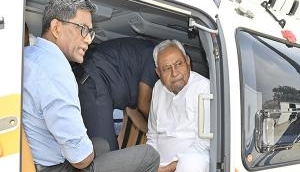P Sainath: Water and farm crisis are the defining problems of our time

- Delhi Assembly Speaker Ram Niwas Goel has started a special lecture series for its legislators
- P Sainath was the first to kick off the series with his introductory lecture on Monday
- P Sainath spoke to legislators about the mega water crisis plaguing India
- He blamed it on stark inequality, deforestation and concretisation
- What are the solutions in this water crisis?
- Can 2016 monsoons fix the water issue in the country?
The Delhi Assembly saw a refreshing new speaker coming in on Monday to lecture its members.
In a new initiative by Speaker Ram Niwas Goel, proceedings for the day were kickstarted by a lecture series. The first lecture in the series was delivered by veteran journalist and Ramon Magsaysay awardee P Sainath, who spoke on 'Water and Farm Crisis in India'.
Delhi Chief Minister Arvind Kejriwal inaugurated the series by admitting that he was "an admirer and fan" of Sainath and praised him for keeping the issues plaguing the farmers relevant for the world to understand.
Listening to his insights on rural distress and social issues was "much needed for sound decision making" said Kejriwal.
Defining the crisis of our times
Sainath began by defining drought as a 'mega water crisis'. For those who were optimistic about this year's monsoon easing the woes of the farmers, he clarified at the outset, "Monsoon is a relief. Not a solution".
Pointing out multiple facets of the drought issue, ranging from the hydrological (the over use of ground water) to agricultural, which is unfolding because of a serious water crisis, Sainath said that the drought was man-made and tailored to affect the poorest of us the most.
Speaking of his visit to the source of the Krishna river in Satara, the source of the Godavari at the Ram Konda Ghat and to Triyumbakeshwar, Sainath said that for the first time in history, river sources are drying up because of extensive deforestation and concretisation.
Because of deforestation and concretisation, water can no longer collect anywhere, leading to a water crisis, Sainath said.
"At the Ram Konda Ghat, where you get water only once in three days, every day 60 to 90 tankers of water are poured into the river for the people to bathe. This is official. People bathe in the sacred waters of a tanker!" he said laughing.
Speaking of Maharashtra, Sainath said, "No state has spent more money to produce less water than Maharashtra."
Also read: Water supply once a month: lessons to be learnt from Latur
Calling the extraordinarily high rural distress a 'lifestyle crisis', Sainath said that three districts in Maharashtra - Mumbai, Thane and Pune get 53% of Maharashtra's drinking water when they only have a third of the entire state's population.
The lifestyle crisis can be seen in the form of "inequality which stands naked in the water and farm crisis," he said. Transfer of resources from poor to rich in terms of land and water cannot be more stark than they have been in the last 20-25 years, Sainath said.
Also read: World Water Day: a few numbers to make you think twice before wasting this resource
Speaking of construction companies building skyscrapers boasting of Olympic-sized swimming pools, such as the Aquaria Grand building 200 swimming pools in each of its flats in water-stressed Borivilli, Sainath said that these constructions are responsible for accelerating the inequality in water use and bringing on the drought.
He also called the water crisis "policy driven" mentioning that beer companies pay 4 to 5 paise per litre of water as compared to ordinary people who are made to spend 100 times more per litre. "Interest of ordinary people come last," he said.
Sainath also posed some thought provoking questions in the light of increasing commercialisation of water.
Is drinking water a human right or a commodity?
"Lets first figure out the water we need for drinking, cooking and sanitation. Then we'll figure where IPLs and swimming pools come," Sainath said.
"Top one per cent of Indians owned 53% of total wealth as of 2015. Nowhere has inequality grown faster in the last 15 years," he said pointing out that India featured below Bolivia, at 130, on the Human Development Index.
"This inequality in the country reflects on water issues, education, health and every other aspect," he said. The mega water crisis is not going to go away with the monsoon said Sainath.
"We have to decide who owns what. Basic rights of Indian citizens such as health, water and food need to be guaranteed. Water and farm crisis are the defining problems of our times...basic solutions are defined in the Constitution," said Sainath in his closing remark.
Food for thought
An official release ahead of the lecture said,"The lecture series is aimed at facilitating enhanced understanding among elected representatives vis-a-vis diverse issues confronting the society."
The Legislative Assembly plans to organise lectures on various subjects to be delivered by experts/professionals from respective fields, for the benefit of legislators.
The initiative is expected to enrich debates in the House and enhance the performance of legislators.
With Sainath's lecture, Delhi legislators got something to think about and work on so as to strengthen the state's social policy.
Edited by Jhinuk Sen
Also read: Warning notes from Marathwada: how water wars can consume India
Also read: #DroughtWatch: Is Hyderabad going the Latur way?
First published: 27 June 2016, 7:22 IST





![BJP's Kapil Mishra recreates Shankar Mahadevan’s ‘Breathless’ song to highlight Delhi pollution [WATCH] BJP's Kapil Mishra recreates Shankar Mahadevan’s ‘Breathless’ song to highlight Delhi pollution [WATCH]](https://images.catchnews.com/upload/2022/11/03/kapil-mishra_240884_300x172.png)

![Anupam Kher shares pictures of his toned body on 67th birthday [MUST SEE] Anupam Kher shares pictures of his toned body on 67th birthday [MUST SEE]](https://images.catchnews.com/upload/2022/03/07/Anupam_kher_231145_300x172.jpg)






